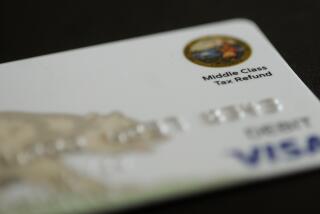Don’t swallow that phish bait
- Share via
IT was painful to me in the first place, as I gathered up my various “W” forms and weighed my deductions against income, to realize that I probably wouldn’t get any kind of tax refund this year. I’ve made too much money.
This is not to say I am in the category of Bill Gates or Oprah Winfrey or even the woman down the block who walks dogs for a very nice income. We have a lot of dogs where I live and people with money enough to have them walked by someone else.
By taking on outside magazine assignments and writing an occasional book, I am in the category of making more than a drywall plasterer but not as much as a plumber. I can feed my wife, the cat, the turtle and the fish, but frequent trips to Oakland are out.
All of that was bad enough, and now I find that I am not going to receive the $163.80 refund that was promised in an e-mail by the IRS. The reason is that it wasn’t the IRS that offered it, although the message bore a likeness of its logo and was presented in its whimsical bureaucratic language, like, “After the last annual calculation of your fiscal activity ... “
I realize that $163.80 probably would not impress Donald Trump, but to me it means 16.3 martinis with change for a tip. As it turns out, the offer is a fraud. I don’t get anything. Hold the martinis.
I became suspicious when the e-mail asked for my Social Security number, my credit card number, my ATM password and a description of the tattoo on my behind. A lightbulb flashed over my head, like Elmer Fudd suddenly realizing Bugs Bunny had gotten away again. I was suddenly realizing the promise of a refund was a fake.
My suspicion was subsequently verified by Nancy Mathis, who is a spokeswoman for the IRS in Washington, D.C., where the real money is. It is a scam that has been around since about November but has picked up tempo just in time to nail those of us who are about to file early income-tax returns.
Simple people that we are, we reason that if the IRS deposits the refund in our credit-card accounts, it would give us an edge in paying off what we will probably owe in April. So we send in all of the numbers the scammers want and sit around smiling stupidly while the people who initiated the fraud use our various accounts to buy Lamborghinis or condos on the French Riviera, while gathering beautiful women in sleek, form-fitting gowns who never have headaches or yeast infections.
Mathis tells me that there are 12 identity scams from 11 countries aimed at the U.S., where all the wannabe millionaires are, like old ladies who spend their Social Security checks on lottery tickets, and garage mechanics who cash in their pensions to invest in tortilla futures.
It comes under the heading of “phishing,” which is defined as a way to gain personal information for purposes of identity theft. The scammers use e-mails that bear the counterfeited logos of legitimate businesses that would never actually indulge in foreign trickery. The legit firms gouge us the good old American way -- by overcharging.
One has to admire the facility of those who utilize modern electronic techniques to separate us from our money. In addition to mastering international e-mail, they learn from their failures. Earlier efforts to reel in our money probably weren’t working too well anymore so they hit upon the IRS gimmick.
I still get messages now and again from various African or Asian countries, but not as many. The senders identify themselves as deposed emirs, dictators in hiding or widows of slain black-marketeers with hidden cash, all eager to share their holdings. If I send them my personal information, they will store their millions in my bank account for later withdrawal when no one is looking. For this they would give me millions of dollars to keep as a service fee.
NO one has ever given me anything for doing nothing. I have had to take a number of humiliating jobs over the years to pay my way through college and keep my head above the quicksand, while the suction of the muck kept pulling me down. And here I am at an age when I can order senior lunches at Denny’s and I’m still struggling to keep my head above the surface.
So I e-mailed a deposed emir and said I’d give him the information he wanted if he would send me a certified check for $1 million to indicate good faith. I guess faith was lacking in his hideout, because I never heard back. Once more, I learned that there are no free lunches, although I can still get that senior rate.
I’m here to tell you today to be careful. The IRS is more apt to take your money than to give it, so do not respond to any e-mail messages, however tempting they might be. The IRS doesn’t e-mail its taxpayers. It writes letters or telephones or has Treasury agents kick in your door at 3 a.m. and drag you away.
That’s my public service message for today. Now it’s back to figuring out a way to beat the tax system by scraping up every deduction I can think of. I know I’m going to lose, but it’s how I play the game that counts.
*
Al Martinez’s column appears Mondays and Fridays. He can be reached at [email protected].
More to Read
Sign up for The Wild
We’ll help you find the best places to hike, bike and run, as well as the perfect silent spots for meditation and yoga.
You may occasionally receive promotional content from the Los Angeles Times.






